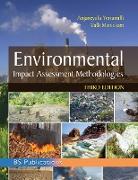- Start
- Environmental Impact Assessment Methodologies
Environmental Impact Assessment Methodologies
Angebote / Angebote:
EIA is an important decision making tool in respect of various developmental projects and the methodologies for objective assessment of environmental implications for different categories of projects are constantly evolving and improving. Though a number of EIA tools are now in extensive use internationally for implementation of various development projects so that proposed projects are economically viable, socially equitable and environmentally sustainable, no single type of method can be used to satisfy the diversity of project activities and the key issue involves selecting appropriate methodology for specific needs in an impact study which needs a comprehensive book to provide the details of all these EIA approaches systematically. The third edition of our book on Environmental Impact Assessment Methodologies covers extensively the key elements, operational details of different types of EIA methods, their applications to assess impacts of various types of developmental activities on soil, water, air, risk assessment, application of RS & GIS in EIA, impacts on social environments, health, cost-effective assessments and mitigation measures. As our first two editions received good response, we came up with this third revised version updating with latest information on the above areas and adding new topics like Strategic Environmental Assessment (SEA). Biodiversity Impact Assessment (BIA) as a Planning Tool, new Air Pollution Dispersion Modeling Approaches. Some interesting and recent case studies are also added to demonstrate the application of EIA for diversified/industrial/development sectors. This revised version caters to the needs of EIA practicing professionals, Graduate/Post Graduate students tacking Environmental Management/EIA as Major.
Folgt in ca. 15 Arbeitstagen
